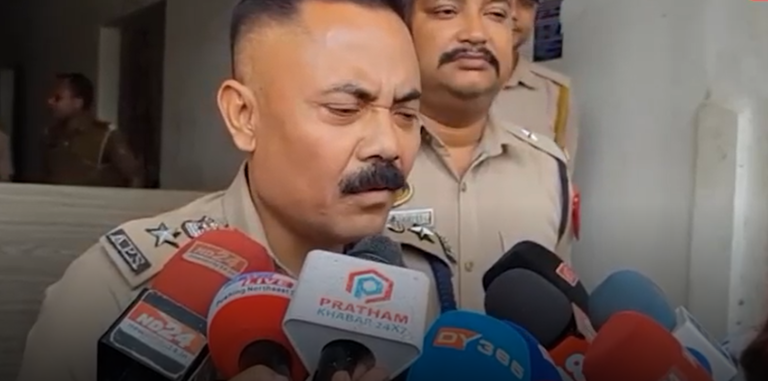Manipur CM’s Apology Sparks Debate: Calls for Unity Amid Political Unrest
Summary
Manipur Chief Minister N. Biren Singh’s recent apology over the ongoing crisis in the state has drawn mixed reactions. While some leaders like Uttar Pradesh Minister Sanjay Nishad urge people not to politicize the apology, others demand greater accountability. The Chief Minister’s plea for peace and reconciliation comes after months of unrest, but whether it can heal the wounds of the state remains to be seen.
Introduction: Apology as a Political Gesture or Genuine Regret?
When a leader steps forward to apologize, it often signals a significant moment of introspection. N. Biren Singh, the Chief Minister of Manipur, issued an apology to the people of his state for the violence and unrest that have marred the region since May 2023. However, such gestures in politics can be a double-edged sword, interpreted as either an act of humility or a calculated move.
Let’s take a closer look at the situation in Manipur, the Chief Minister’s apology, the political reactions, and what it means for the future of this conflict-torn state.
What Led to the Apology? A Quick Recap of the Crisis
The roots of Manipur’s unrest trace back to May 2023, when ethnic tensions between the Meitei and Kuki communities erupted. The violence was triggered by a court order recommending the inclusion of the Meitei community in the Scheduled Tribes list, which met with fierce opposition from tribal groups.
This led to widespread violence, displacement of thousands, and a deepening divide between communities. Months later, the Chief Minister apologized, saying, “This entire year has been very unfortunate. I feel regret and I want to say sorry to the people of the state for what is happening till today.”
Mixed Reactions to the Apology
Support for the Apology
Not everyone saw Singh’s apology as a hollow gesture. Uttar Pradesh Minister Sanjay Nishad expressed his approval, stating that apologies from leaders should be seen positively. “When he realized it, he apologized. It should be considered as a good thing, and people should not do politics on this,” Nishad remarked.
This sentiment reflects a broader call for unity, suggesting that now is the time for collective healing rather than political maneuvering.
Criticism from the Opposition
On the flip side, opposition leaders, including Congress figures, criticized the apology, labeling it as insufficient. They demanded accountability, with some suggesting that Singh should step down if he truly believes he has failed.
The opposition’s stance highlights a critical divide: while some see the apology as an acknowledgment of failure, others interpret it as a deflection from tangible action.
Analyzing the Chief Minister’s Words
Sincerity or Political Strategy?
Singh’s apology, while emotional, raises questions. Was it an earnest effort to bridge the divide, or a strategic move to regain public trust? In politics, apologies often carry layers of meaning, and the context matters immensely.
For many citizens, actions will speak louder than words. The apology could be the first step toward reconciliation, but it will take more than just words to mend the fractured relationships in Manipur.
Addressing the Real Issues
One of the key criticisms is that Singh’s apology doesn’t delve deeply into the root causes of the conflict. The socio-political complexities of Manipur, including longstanding grievances over land rights, autonomy, and representation, need more than symbolic gestures.
The Role of Political Leaders in Resolving the Crisis
Encouraging Dialogue
Leaders like Sanjay Nishad have emphasized the importance of depoliticizing the situation. The focus should be on fostering dialogue between communities rather than using the crisis as a political weapon.
Demands for Accountability
At the same time, opposition leaders are right to demand clarity and accountability. An apology, no matter how heartfelt, cannot replace concrete actions to restore peace and justice.
The Path Forward: What Needs to Be Done?
1. Rebuilding Trust Among Communities
The divide between the Meitei and Kuki communities needs to be addressed through meaningful dialogue and confidence-building measures. Apologies are a start, but genuine reconciliation requires sustained efforts to bridge gaps.
2. Transparent Governance
To regain public trust, the state government must ensure transparency in its policies and actions. Clear communication and fair treatment of all communities will go a long way in calming tensions.
3. Strengthening Law and Order
A secure environment is critical for any reconciliation process. The government must work tirelessly to restore law and order, ensuring the safety of all citizens.
4. Promoting Economic Development
Economic disparities often exacerbate social tensions. By investing in development projects that benefit all communities, the government can create shared goals that unite rather than divide.
FAQs
1. Why did the Manipur Chief Minister apologize?
The Chief Minister apologized for the violence and unrest in the state since May 2023, expressing regret for the suffering of its people.
2. What has been the reaction to the apology?
Reactions have been mixed. Some leaders, like Sanjay Nishad, support the gesture, while others, particularly from the opposition, criticize it as insufficient and demand greater accountability.
3. What triggered the unrest in Manipur?
The violence began in May 2023, following ethnic tensions between the Meitei and Kuki communities over a court order recommending the inclusion of the Meitei community in the Scheduled Tribes list.
4. How can peace be restored in Manipur?
Restoring peace will require inclusive dialogue, transparent governance, strengthened law and order, and initiatives to promote economic development.
5. Is the apology enough to address the crisis?
While the apology is a significant step, it is not enough on its own. Tangible actions and long-term solutions are needed to resolve the deep-rooted issues in Manipur.



